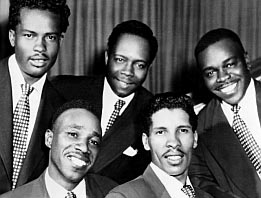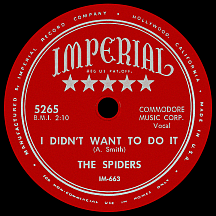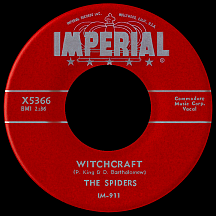THE SPIDERS
I Didn't Want to Do It
There were four singing Carbo brothers from New Orleans. Hayward Carbo (everyone called him "Chuck") and the younger Leonard Carbo (his nickname was "Chick") joined The Zion City Harmonizers around 1950. The gospel group performed for Sunday church services while working regular jobs during the week (Chuck drove a dump truck), then later began making more frequent appearances locally under a new name, The Delta Southernaires. Eventually they yielded to the temptation to sing rhythm and blues and, as The Spiders, enjoyed a couple of years of national success between 1954 and '56.
Number two brother Chick had a job moving furniture and one day he played a tune on a customer's piano. As a mover, such behavior isn't particularly professional, but it so happened he was spotted by Phyllis Boone, who was impressed by his skill. She worked at the J&M Studio as an assistant to owner Cosimo Matassa and as a result the group was invited to audition at Cosimo's small-but-influential recording studio where many hitmaking artists, most notably Fats Domino, had made their best records. Cosimo was looking for a rhythm and blues act and while the gospel-focused Southernaires hadn't intended to tackle "worldly" music, they nevertheless returned at a later date with two songs written by their friend Adolph Smith of local quintet The Monitors: "You're the One," a ballad highlighted by lead singer Chuck's slick style, and "I Didn't Want to Do It," an uptempo number consistent with the sax-driven scorchers that were selling like crazy. Chuck, Chick and the other members, tenor Joe Maxon, baritone Mac West and bass man Oliver Howard, put together the finished masters at a December 1953 session led by Domino's regular collaborator and Matassa's main man Dave Bartholomew, along with the usual bunch of top-flight New Orleans musicians.
The five members couldn't agree on a secular moniker, but Chuck's wife happened to mention she'd seen a spider in the garage at home...and the Spiders had a name. Bartholomew was key in setting up a contract for the group with Los Angeles-based label Imperial (owner Lew Chudd, flush with the success of Fats, was open to just about anything Dave suggested). Both songs had separate runs on Billboard's R&B charts in the spring of '54; "I Didn't Want to Do It" ('...but she thrills me so!'), about a woman who won't take "no" for an answer (a song lyrically at odds with the group's religious orientation), was one of the biggest hits of the year. The two-sider even worked in songwriter Smith's favor; the Monitors got an opportunity to record two songs for Imperial in late '54 and later had releases on Aladdin and Specialty while recording everything at Cosimo's studio. Smith also composed several more Spiders songs.
Abandoning their day jobs, the Spiders continued to appear around town as the Delta Southernaires without revealing their arachnophobic alter egos. Once the secret leaked out Matassa, Boone and Bartholomew weren't all that concerned, but the Historic Second Baptist Church, where the group performed each Sunday, no longer allowed them to participate in the worship services. A full-time move into the R&B field had became their only option. The second single, "I'll Stop Crying," with a dual-Carbo lead, didn't draw much attention, but third effort "I'm Slippin' In" (about coming home quietly after a late night of partying while wifey's sleeping), a lively tune with a Chuck Carbo lead vocal, hit the national R&B Juke Box top ten in July. Bill Moore replaced the departing Maxon and Chick (not Chuck!) handled lead vocal duties for awhile. "'21'" (a remake of female firecracker Jewel King's 1950 hit "3 x 7 = 21," penned by Bartholomew) was another big Juke chart hit in January 1955.

Right around this time, Chuck accompanied Dave Bartholomew on a trip to L.A. for a discussion with the big boss about a possible solo career; word got back to the rest of the Spiders and relations were never quite the same. Three disappointing singles took them through most of 1955 as the Spiders ventured forward as a quartet, while Chuck was doing solo gigs in area clubs. After he rejoined the group later in the year, they scored their biggest hit since the debut smash; "Witchcraft," with its infectious beat and vertigo-inducing lyrics ('My head is spinning, goin' around an' around...'), caught on quickly, staying in the R&B top ten from December '55 through Febraury '56 (Elvis Presley, who'd just signed with RCA Victor, surely took note; he remade the song eight years later, adding it to his lengthy string of hits). The Spiders were hot, booking big auditorium shows across the U.S., though strangely the one place they didn't often appear was at home in New Orleans (mainly sticking to the smaller clubs), possibly a result the spiritual/secular controversy.
One single, "Don't Pity Me" in early '56, was credited to Chuck Carbo and the Spiders. Then Chick signed with Atlantic, essentially taking the solo route before his older brother. At some point another brother, Claude Carbo, did backing vocals at some of Chick's shows. The Spiders at this point were mainly Chuck and Joe Gaines with various backing singers; "A-1 in My Heart" and "Goodbye" were strong, upbeat efforts, though added little to what had come before. "That's My Desire" had a peppier tempo than Frankie Laine's original, but failed to compete on any level. In 1957 Chuck Carbo finally put out two solo recordings, but momentum had been lost. Over the next two decades he occasionally made records but never as a member of the Spiders.
Chick Carbo, on the other hand, formed a new Spiders group in 1960 that included Howard and Moore. They rerecorded "You're the One," receiving a fair amount of airplay in several markets, notably on the west coast, in what amounted to the act's last stand. Another singing brother emerged in 1968, as Claude and Hank Carbo issued three solid soul-duo discs on the Castle label. Meanwhile, a great many fans of The Spiders, mindful of their elite standing among the R&B groups of the mid-'50s, remained loyal to them. Several reissue albums, mainly in foreign editions, have appeared throughout the decades.



